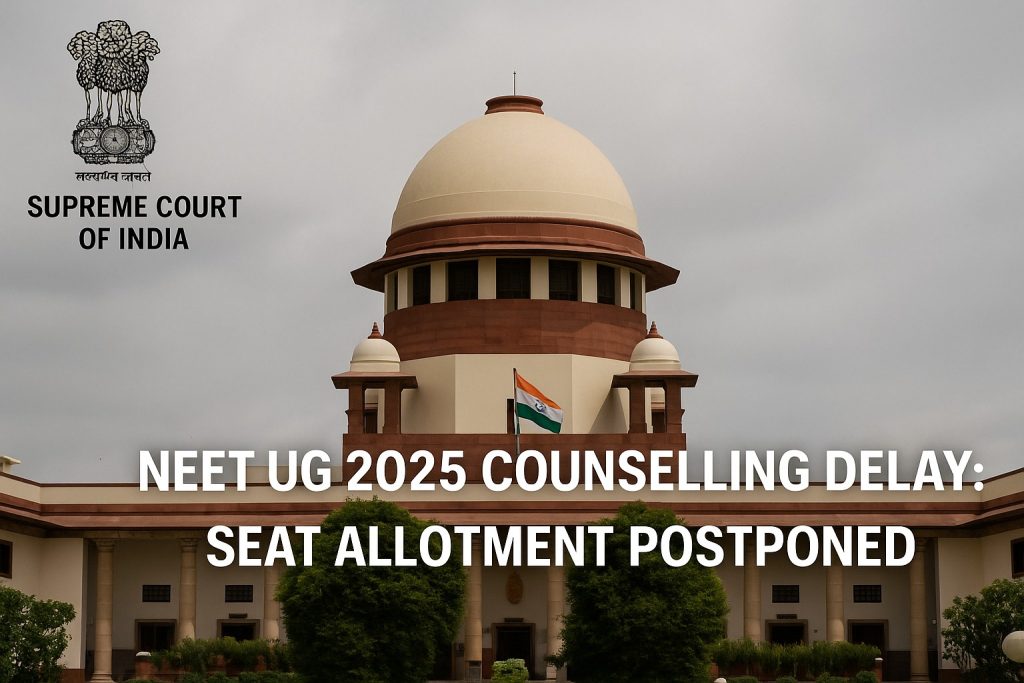
New Delhi: As days roll on and the much-anticipated NEET UG counseling 2025 faces delays yet again, lakhs of aspirants and their families are gripped with anxiety, confusion, and rising frustration. While qualifying NEET UG is a massive milestone, the real challenge begins afterward—with counseling, seat allotment, and admissions. Unfortunately, with the clock ticking and no clarity on timelines, the lack of action is causing serious mental strain among students nationwide.
The National Eligibility cum Entrance Test (NEET) is a make-or-break exam for aspiring medical students in India. Every year, lakhs of students eagerly await the results to step into the world of medical education. However, this year, a fresh wave of anxiety has swept over the NEET UG aspirants due to significant delays in the Counseling process. With the clock ticking and uncertainty looming, students and parents alike are left wondering whether the current slow-paced allotment process is setting them back in their academic journey. Is a fast-track allotment the solution to this problem? Let’s explore the current state of affairs and the possible need for urgent reforms.
Moreover, many state counselling authorities, including KEA (Karnataka), TN Medical Selection Committee (Tamil Nadu), and UPDGME (Uttar Pradesh), are yet to issue concrete schedules for MBBS admission. This coordination gap between MCC and state authorities is leading to cascading delays.
The Growing Concern: Delay in NEET UG Counseling
The NEET UG Counseling process, which plays a crucial role in determining seat allocation for medical courses, has faced several setbacks this year. The delays have led to confusion, frustration, and panic among students. As the wait for the Counseling process drags on, the pressure is mounting on students who have been preparing for this moment for years.
Many students are finding themselves stuck in a limbo, unable to plan their next steps with clarity. “I’ve been waiting for weeks, and the uncertainty is affecting my mental health. I just want to know my future,” shared Ananya, a NEET UG aspirant from Delhi. With some states having postponed their Counseling rounds multiple times, the ripple effect is being felt nationwide, leaving many candidates scrambling for answers.
The Need for a Fast-Track Allotment System
The question arises: can the solution lie in fast-tracking the allotment process? Students and educational experts believe that the implementation of a streamlined and efficient Counseling system could alleviate the chaos. A fast-track allotment system would ensure that deserving students don’t lose out on opportunities, while also preventing last-minute bottlenecks in the process.
According to experts, the delays in Counseling not only harm students’ career prospects but also create an unnecessary backlog that results in missed opportunities for medical colleges. With private institutions and management quota seats seeing fluctuating demand, the slow allotment process is causing a domino effect on the entire system. A fast-track system could minimize this and ensure timely decisions, leaving students with adequate time to prepare for the next phase of their academic journey.
Fast-Track Counseling: A Step towards Efficiency?
There are strong arguments for the introduction of a fast-track Counseling process. First and foremost, it would offer students more time to plan their academic and financial commitments. This includes understanding the cost of education, arranging accommodation, and settling other logistical challenges before classes begin. Additionally, faster seat allotment would allow students to focus on their studies and future goals without worrying about prolonged uncertainty.
Furthermore, a faster process would reduce the overall stress experienced by students and parents. For many, medical admission is not just about securing a seat but also about managing expectations, navigating through complex fee structures, and making informed decisions about their future. Fast-tracking this process could provide a much-needed respite for families who are already burdened with the intricacies of medical college admissions.
Is the Government Ready to Take Action?
The government and various medical bodies are aware of the growing discontent over counseling delays. Several student organizations have raised concerns, urging for faster decision-making processes. There have been discussions about reforming the existing system to introduce a more transparent, streamlined, and timely approach to seat allocation. However, the practicalities of implementing such reforms on a national scale remain uncertain.
While the government has assured students that every effort is being made to expedite the process, many are questioning the adequacy of these steps. A key challenge lies in balancing fairness and speed — ensuring that every student is given the opportunity to make an informed choice while simultaneously reducing the time spent waiting for allotment results.
The Future of NEET UG Counseling
As the NEET UG Counseling saga continues, the need for reforms becomes even more pressing. The current system’s inefficiencies have resulted in confusion, delays, and unnecessary stress for students who are eager to move forward with their academic careers. The introduction of a fast-track allotment system, coupled with improvements in the Counseling process, could potentially reduce these challenges and provide a more student-friendly environment.
While the focus remains on addressing the immediate delays, it is also time to rethink the entire process. With increasing numbers of aspirants every year, it’s crucial to adapt the system to better serve the growing demand. Whether through technology, streamlined procedures, or better resource allocation, the future of NEET UG Counseling should prioritize speed, transparency, and efficiency.
In conclusion, the delays in NEET UG Counseling have undoubtedly caused considerable anxiety among students. It’s now clear that a fast-track allotment process could provide a much-needed solution. However, it’s up to the authorities to act quickly and decisively, ensuring that this year’s aspirants aren’t left in a prolonged state of uncertainty. As the situation continues to evolve, one thing is certain: change is needed, and it’s needed now.

